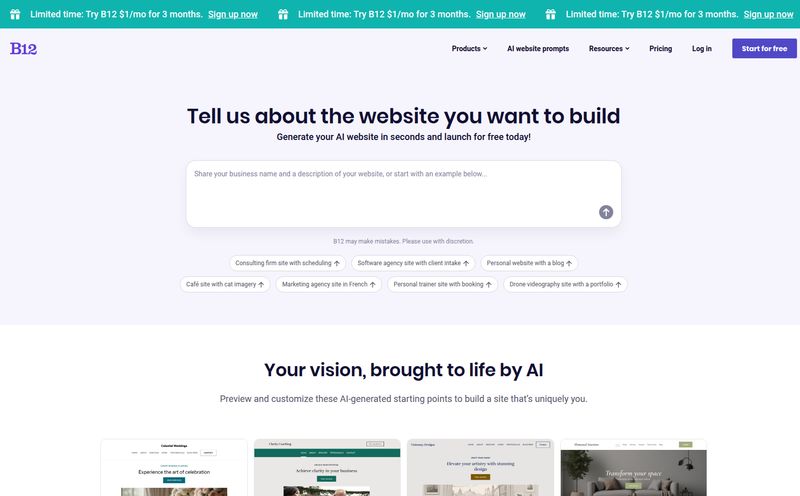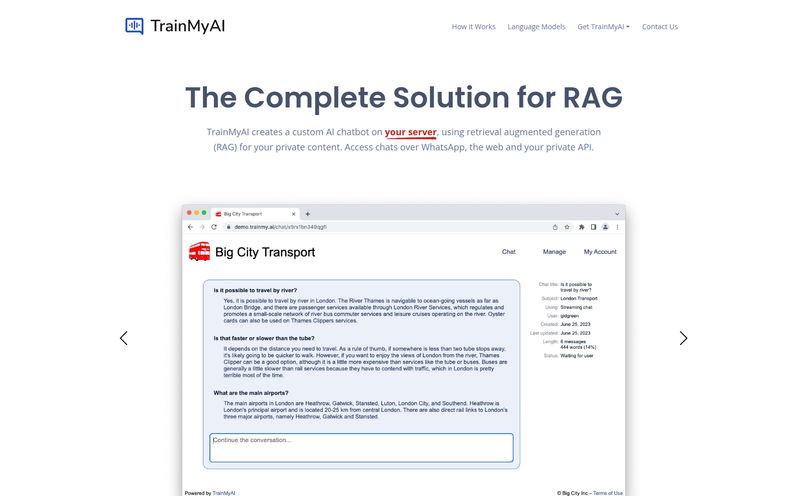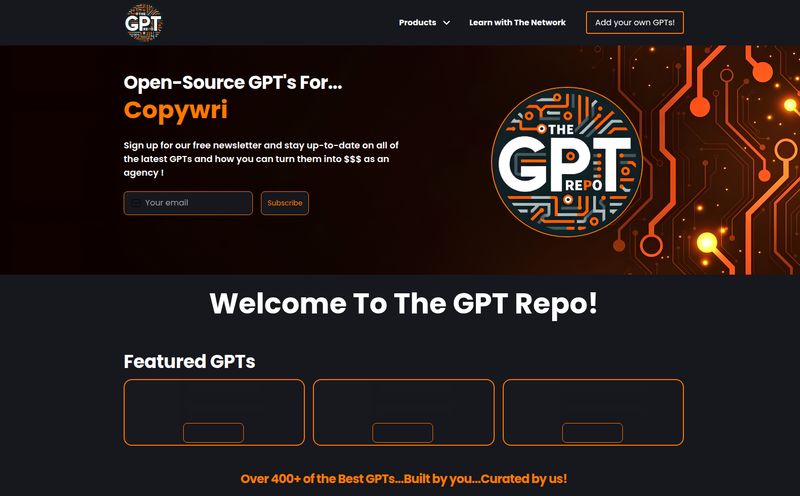We've all been swept up in the AI content whirlwind over the last couple of years. It's been a wild ride, hasn't it? One minute we're painstakingly chipping away at a blog post, the next we have tools like ChatGPT that can spit out 1,000 words in ten seconds. But here's the rub... a lot of that content is, well, meh. It's generic. It's soulless. It sounds like a robot wrote it, because, duh, a robot wrote it.
I've spent more hours than I'd care to admit trying to wrestle with language models, trying to coax something genuinely brilliant out of them. It's less of a conversation and more like trying to give stage directions to an actor who's a bit too literal. You can't just say "be sad"; you have to say, "your posture is slumped, your eyes are downcast, a single tear rolls down your cheek... you just dropped your ice cream." Specificity is everything.
That, my friends, is the art and science of prompt engineering. And apparently, there’s now an AI for that. I recently stumbled upon a tool called Fusion, which claims to be an AI-powered software for enhancing GPT prompts. An AI to help you talk to another AI better? It sounds a bit like an Escher painting, but I was intrigued. So I decided to see what the fuss was about.
First Off, What Are We Even Talking About with Prompt Engineering?
Before we get into Fusion, let's get on the same page. Prompt engineering isn't just about asking a question. It's about crafting the perfect set of instructions. Think of it like this: if you tell a chef to "make dinner," you might get a peanut butter sandwich. But if you give them a detailed recipe—with ingredients, measurements, and steps—you're going to get a masterpiece (or at least something edible).
Good prompt engineering is the difference between getting a bland, high-school-level essay on marketing and getting a sharp, insightful analysis of CPC trends in the B2B SaaS sector, written in the style of Hunter S. Thompson. It's the secret sauce. And for many of us, it's a constant struggle to find the right ingredients.
So, How Does Fusion Fit into This Picture?
Fusion positions itself as your sous chef in the AI kitchen. The idea is simple but pretty clever: you give it your basic, half-baked prompt, and it uses its own AI, built on OpenAI's tech, to refine it. It aims to turn your simple request into a detailed, creative, and unique prompt designed to get a much higher-quality result from GPT.

Visit FusionAI
Instead of you having to remember all the tricks—like telling the AI to adopt a persona, use the 'Chain-of-Thought' method, or provide few-shot examples—Fusion does the heavy lifting. It's supposed to be the prompt-whisperer that translates your intent into a language the big AI models truly understand.
The Main Promises of Fusion
From what I've gathered, the platform's whole reason for being rests on a few core ideas. It’s about AI-powered prompt engineering, which is the main function. It also offers enhanced GPT prompt generation, taking your base ideas and building on them. Finally, it’s about generating unique and creative prompts, which is probably the most attractive part for content folks like me who are tired of seeing the same old AI-generated sentence structures everywhere.
My Honest Take: The Good, The Bad, and The Hazy
I’m a skeptic by nature. I've seen a million 'game-changing' AI tools pop up in the last year alone. Some are gold, most are just... shiny rocks. So I approached Fusion with a healthy dose of side-eye.
What I Genuinely Like
The biggest plus here is the promise of simplicity. The idea of an easy-to-use tool that helps you bypass the steep learning curve of advanced prompt design is a huge win. Not everyone has the time or patience to read through whitepapers from Google's AI labs just to write a decent email. I certainly have my days. A tool that can spark creativity when you're feeling stuck is invaluable. It’s like having a brainstorming partner on call 24/7. That promise of generating unique and creative angles is the holy grail for anyone trying to stand out in a sea of AI-generated noise.
Where I'm Left Scratching My Head
Now for the not-so-great. The biggest issue I have right now is that the platform feels a bit like a ghost ship. When I went looking for more information, the website was… sparse. There isn't a lot of content there to really get a feel for the software's true capabilities beyond the top-line pitch. It's hard to judge a book by its cover when the cover is mostly blank.
And that leads to the elephant in the room: the price. There is absolutely no pricing information available. Is it free? Is it a monthly subscription? Is it per-use? Your guess is as good as mine. This lack of transparency is a bit of a red flag for me. In my experience, when companies are shy about pricing, it's usually not because it’s incredibly cheap. I hope I'm wrong on that one, though.
The greatest tools are the ones that become an extension of your own mind. The question with Fusion is whether it's a powerful extension or just an extra step.
Who Is a Tool Like Fusion Really For?
Assuming it delivers on its promises, I can see a few groups of people getting a lot out of this.
Content Creators and Marketers: This is the obvious one. Anyone tasked with creating blog posts, social media updates, ad copy, or email campaigns could use Fusion to get better first drafts and more creative ideas. It could seriously speed up the ideation process.
Developers and Tech Teams: Folks using the OpenAI API for their own applications could potentially use Fusion to engineer better system prompts for their products.
Students and Researchers: For brainstorming, summarizing complex topics, or drafting papers, a better prompter could lead to more insightful and useful outputs from research AI's.
The Curious Hobbyist: Let's be honest, a lot of us just like to play with this stuff. If you're an AI enthusiast who wants to see what these models are truly capable of, this could be a fun new toy.
So, Is It Worth Watching?
Despite the lack of information, I’m not writing Fusion off. The concept is solid. The problem it’s trying to solve is very, very real. Getting high-quality, non-generic output from generative AI is the number one challenge for anyone working in this space. If Fusion can genuinely and consistently turn a mediocre promt into a brilliant one, it could easily become an indispensable part of my workflow.
For now, it’s on my watchlist. I’m waiting to see more examples, more details, and of course, that all-important price tag. It's a promising spark, but I need to see if it can actually start a fire.
Frequently Asked Questions About Fusion AI
- What is Fusion AI in simple terms?
- Fusion is a software tool that helps you write better instructions, or prompts, for AI models like ChatGPT. You give it a simple idea, and it turns it into a more detailed, creative prompt to help you get higher-quality content from the AI.
- How does Fusion actually improve GPT prompts?
- It uses its own AI to analyze your initial request and then enhances it by adding detail, context, specific instructions, and creative constraints. This helps guide the main AI (like GPT-4) to produce a more nuanced and relevant response.
- Is Fusion AI easy for a beginner to use?
- Based on the information available, one of its main selling points is ease of use. It's designed to help people who aren't expert prompt engineers get expert-level results, so it should be quite user-friendly.
- Can I use Fusion with AI models other than OpenAI's GPT?
- The description specifically mentions GPT technology. While the principles of good prompting apply to other models like Google's Gemini or Anthropic's Claude, it's unclear if Fusion is optimized for or directly compatible with them. You would have to check their official documentation once its more available.
- What is the pricing for Fusion AI?
- As of this writing, there is no public pricing information for Fusion. This is one of the biggest current unknowns about the service.
My Final Thoughts for Now
The world of AI tools is moving at a breakneck pace, and it’s hard to tell which ones will stick around. Fusion has a genuinely interesting premise that tackles a real pain point for anyone in the content and SEO world. It's not about replacing your thinking; it's about sharpening it. I’m optimistic but cautious. If the execution matches the ambition, and the price is right, Fusion could be a name we hear a lot more often. I’ll be keeping an eye out, and you should too.
Reference and Sources
- OpenAI's official page on their technology: openai.com
- A primer on prompt engineering from the experts at a16z: a16z.com/prompt-engineering-a-new-profession/



